Corsair Force LS (240GB) Review
by Kristian Vättö on September 25, 2013 12:00 AM ESTRandom Read/Write Speed
The four corners of SSD performance are as follows: random read, random write, sequential read and sequential write speed. Random accesses are generally small in size, while sequential accesses tend to be larger and thus we have the four Iometer tests we use in all of our reviews.
Our first test writes 4KB in a completely random pattern over an 8GB space of the drive to simulate the sort of random access that you'd see on an OS drive (even this is more stressful than a normal desktop user would see). I perform three concurrent IOs and run the test for 3 minutes. The results reported are in average MB/s over the entire time. We use both standard pseudo randomly generated data for each write as well as fully random data to show you both the maximum and minimum performance offered by SandForce based drives in these tests. The average performance of SF drives will likely be somewhere in between the two values for each drive you see in the graphs. For an understanding of why this matters, read our original SandForce article.
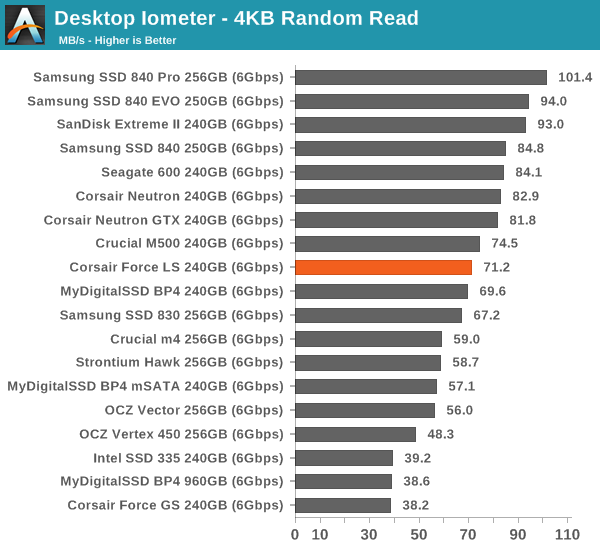
It looks like random read performance has received some improvements in the latest firmware, making the Force LS 14MB/s faster than MyDigitalSSD's BP4.
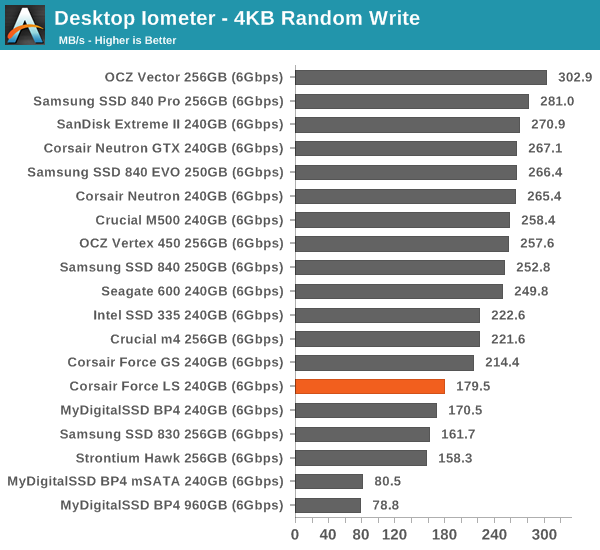
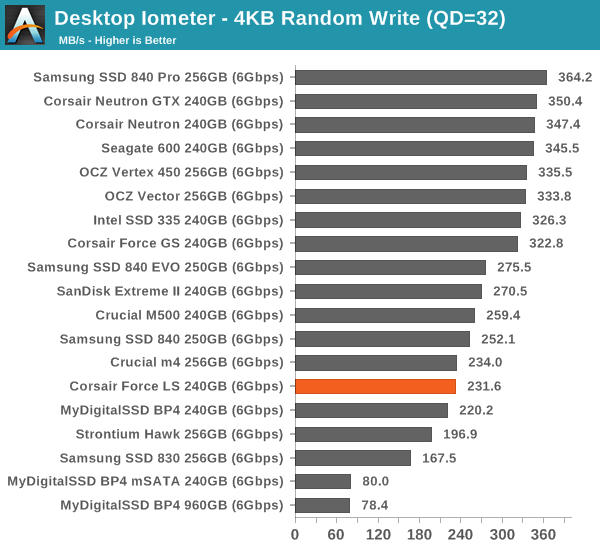
Random write performance is also marginally better than BP4's but overall it's Phison's biggest issue. Dealing with random writes has always been the toughest job for manufacturers, especially if you're aiming to make a budget SSD. It's good to see some improvement on this front but Phison must step up their game if they're looking to play in the high-end series.
Sequential Read/Write Speed
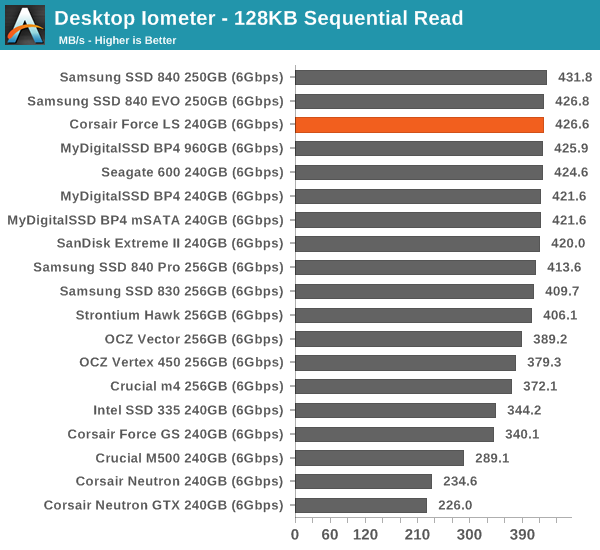
Sequential transfers are much easier to deal with and that we can see in the results. Read performance is top-of-the-class and write performance is not far behind the fastest models.
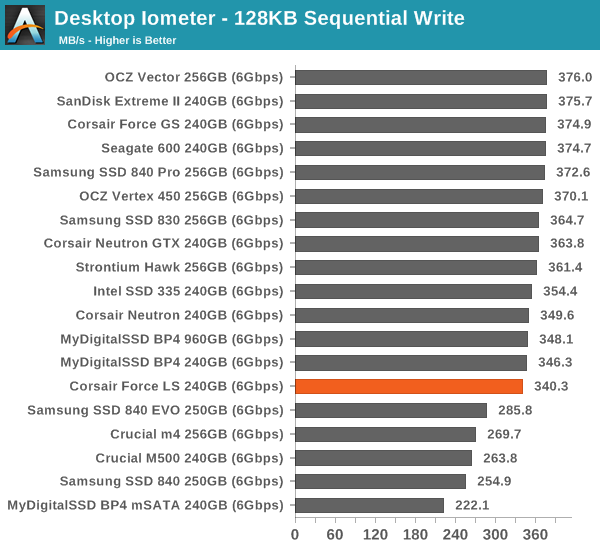
AS-SSD Incompressible Sequential Read/Write Performance
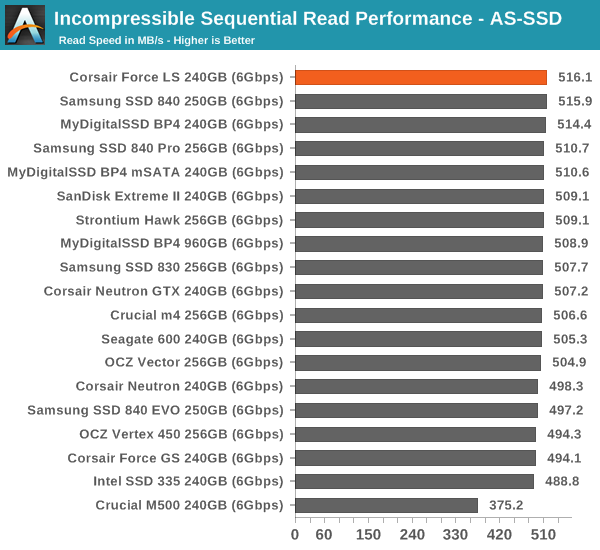
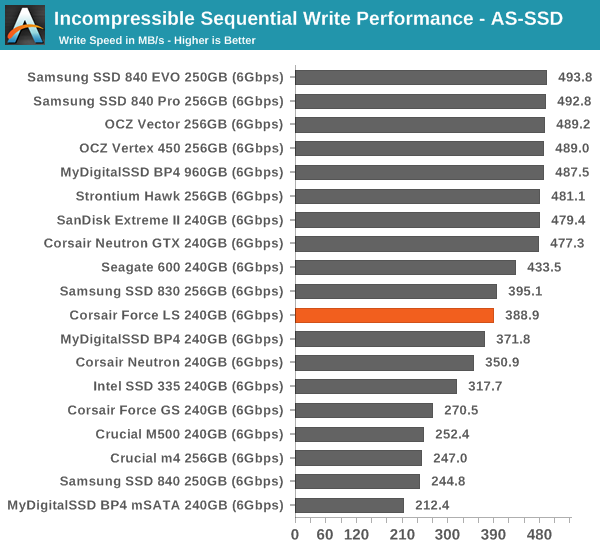










25 Comments
View All Comments
Runamok81 - Wednesday, September 25, 2013 - link
Looks like we have a shrinking middle-class withh SSDs as well. Does this mean manufactuers should focus on one extreme of the performance/value slider or else risk consumers purchasing leftover stock from last years tech?MrSpadge - Wednesday, September 25, 2013 - link
The problem with budget and middle class SSDs is that the bulk of the cost goes into the flash - which you have to buy anyway. The controller does cost a bit, but you can't save much by making an SSD slower. That's why it's not really worth it for customers to spend a little less for a significantly slower SSD. Exception: Samsung 840/840 Evo. they've still got the excellent controller and at least decent performance, yet they mostly cost significantly less than others.ericbentley - Monday, September 30, 2013 - link
Samsung 840/840 Evo can afford to use a good controller yet still be budget oriented because they use TLC flash, while the Corsair LS here still uses MLC. While MLC is better in terms of longevity, most people still want the benefits of speed from the controller and MLC vs TLC is a back-burner issue for themI'm wondering if Corsair had tried TLC before and had some reason for not using it for a drive like this, seems like a no brainer to me, unless they couldn't secure a large enough supply
Kristian Vättö - Wednesday, September 25, 2013 - link
I think we are starting to get to a similar point as where DRAM is now. For an average user, the difference between a low-end and high-end SSDs is becoming negligible because even the low-end SSDs are pretty good now (e.g. the Force LS). That means the middle-class no longer serves a purpose because the average users will mostly go with the cheaper options and enthusiasts only want the fastest.vol7ron - Wednesday, September 25, 2013 - link
The big thing still out there, that hasn't been answered is lots of flash for cheap. When buying an SSD many customers look for the fastest, since the cost is marginal between what's available. However, the one area of the market that is still "expensive" is in the mass-flash +1TB (or even +512GB). Even with a slower controller/NAND, I think Corsair could slide into this space. Look at Apple and what they're shipping their new Mac with - what's it called? Fusion? - essentially a hybrid drive, rebranded. I'm sure a company that focuses on the best balance of quality vs cost, wouldn't do that if SSD costs were lower. --- There's still the niche market for high capacity flash, the ultimate HDD terminator.Spoony - Sunday, September 29, 2013 - link
Apple is shipping a 128GB SSD alongside a normal platter drive in 1TB or 2TB configurations. Fusion Drive is just the name for a logical volume manager with block migration. They are not re-branding a hybrid drive like a Momentus XT. It is a custom solution which merges two discrete devices in software. For better or worse.I definitely agree with you. 1-2TB SSDs at $0.40/MB rather than the current $0.95/MB would be very compelling. I would buy if it was reliable, even if it wasn't blazing fast.
Spoony - Sunday, September 29, 2013 - link
1TB or 3TB configs. Not 2TB. Sorry.Also, edit functionality would be convenient.
Cumulus7 - Wednesday, September 25, 2013 - link
Since you recommend the Samsung EVO over the Crucial M500: aren't yout concerned that the EVO may not last as long as the M500?I prefer the M500 at the moment since i expect its NAND to last a lot longer. But i may be wrong...
fokka - Wednesday, September 25, 2013 - link
of course mlc should theoretically last longer, but that doesn't mean tlc doesn't last more than long enough, as you can read here:http://www.anandtech.com/show/7173/samsung-ssd-840...
MrSpadge - Wednesday, September 25, 2013 - link
I'd choose and recommend the Evo as well, for all typical users. People write much less on average than they fear they might. It's only a different story for power users, servers etc.